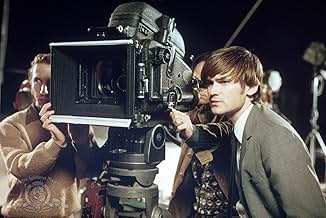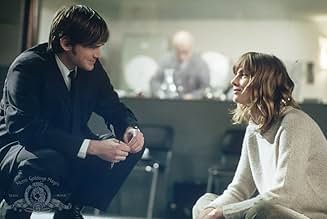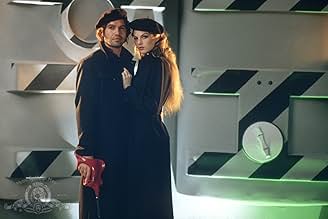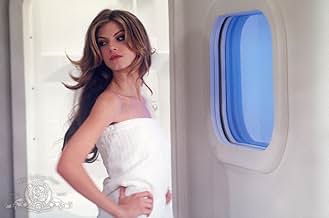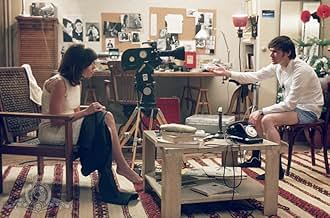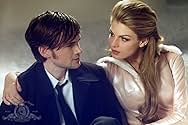PUNTUACIÓN EN IMDb
6,2/10
5,2 mil
TU PUNTUACIÓN
Un joven cineasta hace malabares con la dirección de una cursi película de ciencia ficción, mientras se enfrenta a la relación con su novia que se desmorona.Un joven cineasta hace malabares con la dirección de una cursi película de ciencia ficción, mientras se enfrenta a la relación con su novia que se desmorona.Un joven cineasta hace malabares con la dirección de una cursi película de ciencia ficción, mientras se enfrenta a la relación con su novia que se desmorona.
- Premios
- 1 nominación en total
Reseñas destacadas
Despite the pedigree of being made by the latest Coppola clan member to enter the feature film directorial ranks, CQ came and went from theaters when it was released a few years go. Seeing it for the first time on Reel 13 on Saturday, I'm a little stunned as to why. Roman Coppola proves to be a promising, thoughtful filmmaker and as adept a student of cinema history as his Uncle Francis. CQ is an engaging, if loosely structured movie, managing to be simultaneously inventive and derivative, borrowing from and paying homage to everything from La Dolce Vita to the Marx Brothers.
Its primary source of influence is, of course, 1968's Barbarella, here thinly veiled as the fictional "Dragonfly", as the film within the film. CQ is about how Paul, a young editor (Jeremy Davies), working on said "Dragonfly" deals with balancing his career and his relationship as he works on both the big-budget sci-fi epic and directing his own personal documentary film. This set-up provides Coppola with three different planes of action going on – real life, the black and white documentary and the colorful, sexy, futuristic world of "Dragonfly". The fun really begins when Coppola deftly uses these formats to blur the lines of fantasy and reality when Paul, in his search for himself, begins to lose sight of where the boundaries for each of these worlds lie – or if they even exist.
In addition to Coppola's stellar usage of mixed media, the other key to CQ's success is Jeremy Davies, an extremely talented and severely underused young actor who quite possibly should have won an Oscar for his work in Saving Private Ryan and at least should have been nominated for last year's Rescue Dawn. I think there are less roles for him because he seems to insist on making quirky, out-of-the-box choices. However, when a director with vision is willing to roll the dice on him, he almost always delivers an inspired performance. CQ is no exception as Davies brings a believable, uncomfortable edge to Paul. He is a character who is lost and confused, but most actors would play him with a modicum of swagger. Davies makes him neurotic without being nebbish – as if still a boy in the body a man who isn't quite sure that he wants to grow up. At the heart of Davies' performance, however, still is that extra element of quirkiness that is all his own. It's that extra layer of thought he puts in to his performance and those unusual choices he makes that allows the character to feel fresh – different than what we're used to while at the same time, wholly plausible.
After all is said and done, with all its layers of meaning and different milieus represented within it, CQ ultimately becomes a dissertation on film and the nature of filmmaking as an artform. It depicts the tendency of the artist to lose himself in his work and how said artist can learn to manipulate the art to find his way again (it's no wonder I liked it so much). In that sense, it's a beautifully realized film and another highly auspicious debut from an almost unfairly talented family.
Its primary source of influence is, of course, 1968's Barbarella, here thinly veiled as the fictional "Dragonfly", as the film within the film. CQ is about how Paul, a young editor (Jeremy Davies), working on said "Dragonfly" deals with balancing his career and his relationship as he works on both the big-budget sci-fi epic and directing his own personal documentary film. This set-up provides Coppola with three different planes of action going on – real life, the black and white documentary and the colorful, sexy, futuristic world of "Dragonfly". The fun really begins when Coppola deftly uses these formats to blur the lines of fantasy and reality when Paul, in his search for himself, begins to lose sight of where the boundaries for each of these worlds lie – or if they even exist.
In addition to Coppola's stellar usage of mixed media, the other key to CQ's success is Jeremy Davies, an extremely talented and severely underused young actor who quite possibly should have won an Oscar for his work in Saving Private Ryan and at least should have been nominated for last year's Rescue Dawn. I think there are less roles for him because he seems to insist on making quirky, out-of-the-box choices. However, when a director with vision is willing to roll the dice on him, he almost always delivers an inspired performance. CQ is no exception as Davies brings a believable, uncomfortable edge to Paul. He is a character who is lost and confused, but most actors would play him with a modicum of swagger. Davies makes him neurotic without being nebbish – as if still a boy in the body a man who isn't quite sure that he wants to grow up. At the heart of Davies' performance, however, still is that extra element of quirkiness that is all his own. It's that extra layer of thought he puts in to his performance and those unusual choices he makes that allows the character to feel fresh – different than what we're used to while at the same time, wholly plausible.
After all is said and done, with all its layers of meaning and different milieus represented within it, CQ ultimately becomes a dissertation on film and the nature of filmmaking as an artform. It depicts the tendency of the artist to lose himself in his work and how said artist can learn to manipulate the art to find his way again (it's no wonder I liked it so much). In that sense, it's a beautifully realized film and another highly auspicious debut from an almost unfairly talented family.
Folks, I really, really wanted to like this film. Alas, I found myself looking at the DVD's timer, wondering when the thing would end. So many elements are likable: groovy sixties design, groovy music, groovy chicks, groovy references to (truly) groovy sixties flicks with chicks. But it doesn't hold together. It doesn't flow. It doesn't involve you.
The self-referential dialog and editing had the cloying and self-conscious feel of a student film. (And I had to sit through plenty of those in college, including my own ;-)
Overall, I think Roman has promise, but he has a lot of catching up to do with his sister.
The self-referential dialog and editing had the cloying and self-conscious feel of a student film. (And I had to sit through plenty of those in college, including my own ;-)
Overall, I think Roman has promise, but he has a lot of catching up to do with his sister.
I admit I was just going to see this film for the close-ups of my favorite actor Billy Zane because its been far too long since I've seen his face on the big screen. However, the film was actually well done and had an interesting 60's tone which is pulled off very well. But the one thing that bothered me was why the title "CQ" ? It had one brief reference to CQ > seeks you but not enough to name a whole movie after it. Anyway, Billy did a good job and was very entertaining so for all you Billy fans, go see CQ if you can find it playing near you.
This film is entertaining, thoughtful and beautifully photographed, It cleverly mixes documentary with the real lives of it's characters giving a new twist to the "story within a story" genre. Every actor gives an honest performance in a story that could have easily slipped into the same old tortured artist crap that seems so popular in film today. The soundtrack is very much a part of the story in that it represents the era in which the film is set and the style in which the film within the film is set. Roman Coppola may be Francis' son but he is not a copycat.
Watching the trailer for this movie, I couldn't help but feel excited.
Look at all the swank 60's spy movie references!
Well ... this wasn't the movie I'd hoped for. I believe that "CQ" is Roman Coppola's (son of famous Francis Ford Coppola) first feature-length movie. And I suppose that all first-time directors flail and hick-up in their first (hell, even second and third) films.
But Coppola very blatantly tries to conceal all his director and writer disabilities by shrouding the film with 60's pop-culture trivia ... something that I'm sure his "hipster" handbook directed him to do.
The premise involves an American attempting to edit a ridiculously avant-gard sci-fi/spy Modesty Blaise-esque movie in Paris ... while in his personal time he whines and moans about how he isn't adept enough to sustain a meaningful relationship ... all this through the eyes of a camera. And whilst he records his day-to-day life on film ... he neglects his stunning french girlfriend.
So ... our young American in Paris ends up taking the reigns of the spy movie and plenty of hijinx ensue.
It isn't hard to predict how the movie will end. And if you wait around long enough and can somehow see past Coppola's bloated, pretentious and pedestrian writing and direction ... then you'll have earned a shining ticket to complain about how great this movie COULD have been.
And people wonder why nobody remembers (or wants to remember) this movie. Chalk it all up to the futile attempts of a son of a great director to become more than his father.
Remember ... even old Francis Ford had to LEARN filmmaking. Anyone ever see "Dementia 13?" It wasn't a HORRIBLE movie ... but then again ... it wasn't "Apocalypse Now," either.
Roman's sister, Sophia Coppola has done so interesting work. If anyone inherited Francis Ford's filmmaking genes ... my guess is that it's her. "The Virgin Suicides" is a really excellent movie. "Lost in Translation" wasn't bad either.
So ... Roman ... keep on making those music videos. Your video for "The Strokes" was painfully dull ... but it was a little easier for me to switch channels.
Look at all the swank 60's spy movie references!
Well ... this wasn't the movie I'd hoped for. I believe that "CQ" is Roman Coppola's (son of famous Francis Ford Coppola) first feature-length movie. And I suppose that all first-time directors flail and hick-up in their first (hell, even second and third) films.
But Coppola very blatantly tries to conceal all his director and writer disabilities by shrouding the film with 60's pop-culture trivia ... something that I'm sure his "hipster" handbook directed him to do.
The premise involves an American attempting to edit a ridiculously avant-gard sci-fi/spy Modesty Blaise-esque movie in Paris ... while in his personal time he whines and moans about how he isn't adept enough to sustain a meaningful relationship ... all this through the eyes of a camera. And whilst he records his day-to-day life on film ... he neglects his stunning french girlfriend.
So ... our young American in Paris ends up taking the reigns of the spy movie and plenty of hijinx ensue.
It isn't hard to predict how the movie will end. And if you wait around long enough and can somehow see past Coppola's bloated, pretentious and pedestrian writing and direction ... then you'll have earned a shining ticket to complain about how great this movie COULD have been.
And people wonder why nobody remembers (or wants to remember) this movie. Chalk it all up to the futile attempts of a son of a great director to become more than his father.
Remember ... even old Francis Ford had to LEARN filmmaking. Anyone ever see "Dementia 13?" It wasn't a HORRIBLE movie ... but then again ... it wasn't "Apocalypse Now," either.
Roman's sister, Sophia Coppola has done so interesting work. If anyone inherited Francis Ford's filmmaking genes ... my guess is that it's her. "The Virgin Suicides" is a really excellent movie. "Lost in Translation" wasn't bad either.
So ... Roman ... keep on making those music videos. Your video for "The Strokes" was painfully dull ... but it was a little easier for me to switch channels.
¿Sabías que...?
- CuriosidadesAfter being fired, Andrezej puts his fist through the screening room door. This is a reference to Francis Ford Coppola (father of director Roman Coppola) and his short temper. When the editors get a framed section of the destroyed wall, it is actually a portion of a wall the elder Coppola wrecked in his early directing days.
- PifiasIn the tunnel, when Dragonfly swerves in reverse, there already are skid marks on the ground along the path taken by the car's tires.
- ConexionesFeatured in On the Set of 'CQ' (2002)
- Banda sonoraCe Soir, Je Vais Boire
Lyrics by Gilles Thibaut
Music by Bruno Canfora
Performed by Claude François
Courtesy of Universal International Music, B.V.
Under license from Universal Music Enterprises
Selecciones populares
Inicia sesión para calificar y añadir a tu lista para recibir recomendaciones personalizadas
- How long is CQ?Con tecnología de Alexa
Detalles
- Fecha de lanzamiento
- Países de origen
- Sitio oficial
- Idiomas
- Títulos en diferentes países
- Агент «Стрекоза»
- Localizaciones del rodaje
- Empresas productoras
- Ver más compañías en los créditos en IMDbPro
Taquilla
- Presupuesto
- 7.000.000 US$ (estimación)
- Recaudación en Estados Unidos y Canadá
- 414.358 US$
- Fin de semana de estreno en EE. UU. y Canadá
- 54.942 US$
- 27 may 2002
- Recaudación en todo el mundo
- 499.891 US$
- Duración1 hora 28 minutos
- Color
- Mezcla de sonido
- Relación de aspecto
- 1.85 : 1
Contribuir a esta página
Sugerir un cambio o añadir el contenido que falta


